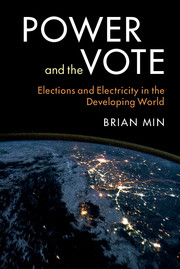Book contents
- Frontmatter
- Dedication
- Contents
- List of Figures
- List of Tables
- Acknowledgments
- 1 Introduction
- 2 Public Goods, Elections, and the Poor
- 3 Power and the State
- 4 Measuring Electricity from Space
- 5 Democracy and Light
- 6 Lighting the Poor
- 7 Electrifying India
- 8 Conclusion
- Appendix Satellite-Derived Estimates of Electrification
- References
- Index
3 - Power and the State
Published online by Cambridge University Press: 05 November 2015
- Frontmatter
- Dedication
- Contents
- List of Figures
- List of Tables
- Acknowledgments
- 1 Introduction
- 2 Public Goods, Elections, and the Poor
- 3 Power and the State
- 4 Measuring Electricity from Space
- 5 Democracy and Light
- 6 Lighting the Poor
- 7 Electrifying India
- 8 Conclusion
- Appendix Satellite-Derived Estimates of Electrification
- References
- Index
Summary
Introduction
Electricity undergirds the modern economy. In 2010, the world used 18.7 trillion kilowatt-hours of electricity – a third more than all the energy used to fuel every car and truck on the planet. Since 1990, global electricity consumption has nearly doubled, exceeding population growth, which increased by 30 percent, and even outpacing the growth of average incomes, which improved by 48 percent in real terms.
The world's thirst for electricity is not abating. Total electricity generation soared from 6,115 terawatt-hours (TWh) in 1973 to 22,126 TWh in 2011, an increase of 360 percent. By contrast, global oil production increased only 45 percent over the same period, from 21 to 29 billion barrels per year (International Energy Agency 2012). By 2012, there were some 62,500 power plants around the world. Despite this frenzied expansion, many countries have been unable to keep pace with demand, which continues to be spurred on by economic development and population growth. The specter this poses for climate change is alarming, a concern to which I return in the book's conclusion.
Satisfying the great demand for electricity remains among the most important and difficult challenges facing governments across the world, as it has ever since power grids were introduced. By 2013, more than 1.3 billion people, a fifth of the world's population, still had no access to electricity. The electrification challenge is most formidable in rural areas, where customer densities are low and poverty can be pervasive. Because of the expense and complexity of this challenge, four in five of those in the world without electricity can be found in rural areas (International Energy Agency 2013).
No country has ever completed rural electrification without the intensive financial support of its government (Barnes and Floor 1996). Especially in the developing world, governments have played central roles in the financing, construction, management, and regulation of the power sector. As Brown and Mobarak (2009, 196) note, “It is difficult to overstate the role of politics in the supply of electricity.” According to their research, governments fully owned the power sector in 103 countries in 2000. In another 50 countries, some part of the power sector had been opened to private investment, and only in 11 was it primarily in the hands of private investors. Given the economies of scale and benefits of uniform standards in electricity provision, governments often retain full ownership and management of utilities.
- Type
- Chapter
- Information
- Power and the VoteElections and Electricity in the Developing World, pp. 36 - 50Publisher: Cambridge University PressPrint publication year: 2015



